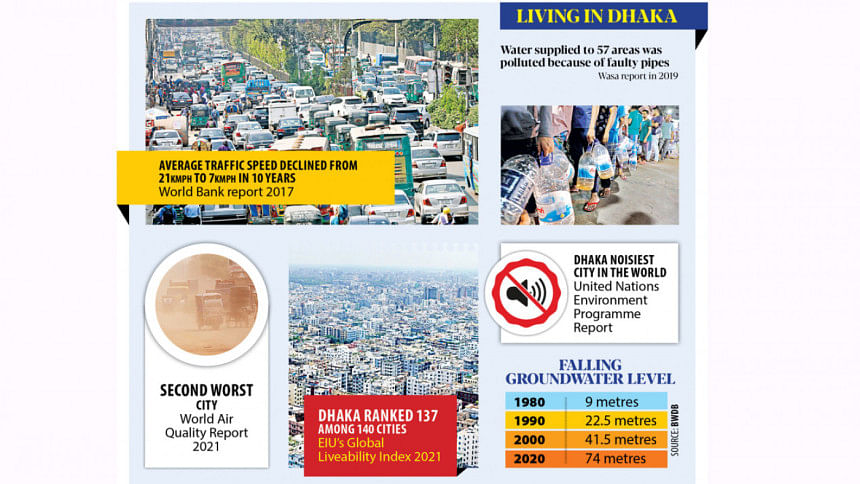Will we soon see the 'end' of Dhaka?

Cities grow or they decline. We have seen this throughout history. But can cities grow and decline at the same time? If you look at Dhaka, with its precariously integral socio-technical system ruthlessly tested every day, it becomes apparent that our beloved capital is increasingly the picture of a city both growing and falling apart. The story of its aggressive development needs no retelling. But look at the price we are having to pay for this—toxic air, harmful noise, unsafe drinking water, perennial waterlogging, heavy traffic, very high population density, astronomical prices of essentials, etc.
It's no surprise that Dhaka now has the distinction of being simultaneously the second-most polluted city and one of the most unliveable cities in the world. A report by this daily on March 31 details how this has been affecting the lives of residents, with their health risks greater than ever, their movement slower than ever, and their overall life prospects grimmer than ever.
Dhaka's air quality, for example, remains a constant source of worries. The average PM 2.5 concentration in the capital is 15 times higher than the limit set by the World Health Organization, thanks to unchecked vehicular emissions, factory fumes, brick kiln smoke, and dust accumulations. There is virtually no oversight of this deadly combination of sources. The issue of unsafe drinking water is no less worrying—with even Dhaka Wasa acknowledging presence of pollutants through faulty pipes. The ongoing cholera outbreak has also been blamed on Wasa's poor supply system. This makes sense when you consider how water, especially in rivers and canals, is regularly polluted through indiscriminate dumping of both household and industrial waste.
Then comes the oft-ignored issue of noise pollution. According to the latest report of the United Nations Environment Programme, Dhaka is now the world's noisiest city, with the average noise frequency here standing at a stupefying 119 decibels. This constant noise from traffic, construction sites or loudspeakers is causing serious health complications. No less disconcerting is the effect of the horrendous congestions on our roads (due to shortage of roads and a ridiculously inefficient traffic control system), or acute waterlogging (due to inadequate drainage, unplanned urbanisation, and encroachment of wetlands and water bodies), or the lack of parks, playgrounds and green spaces.
The combination of all these problems—none of which is less persisting than the others—can make your worst urban nightmare come true at any moment. Which makes us wonder whether the authorities are at all concerned about Dhaka's liveability condition. We believe the city is not still beyond saving, but we may not have much time left. We urge the city managers and planners to urgently formulate an action plan with practical and people-oriented interventions.

 For all latest news, follow The Daily Star's Google News channel.
For all latest news, follow The Daily Star's Google News channel. 



Comments